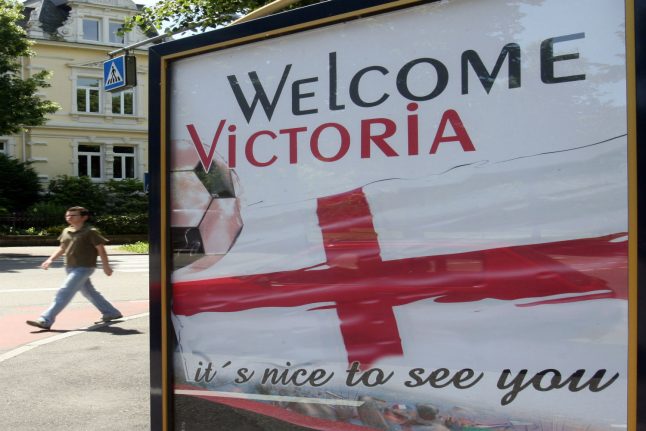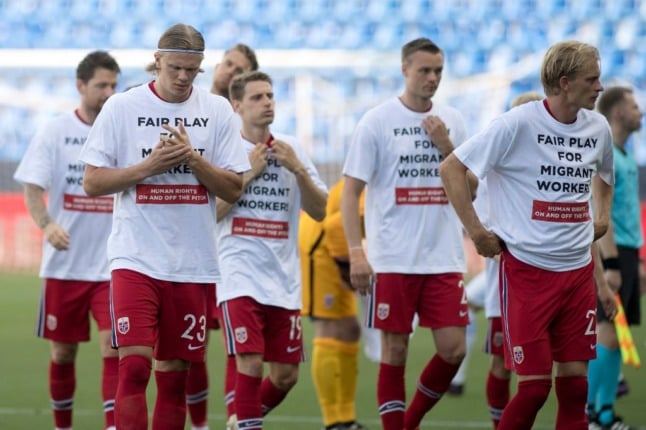The year was 2006. Shakira was riding high in the charts with Hips Don’t Lie, and World Cup fever was gripping the globe as nations battled it out for the number one spot.
As host country, Germany had embraced the competition, offering up 12 venues for the matches, including Berlin’s Olympiastadion and Hamburg’s Volksparkstadion.
Fans waved flags, painted their faces and soaked up the atmosphere at outdoor public viewings during the competition which ran from June 9th to July 9th.
But hearts were broken when Italy won the tournament after a nail-biting game against runners-up France, knocking Germany into third place along the way.
Yes, there was drama, such as France legend Zinedine Zidane being shown a red card for a moment of madness during his final professional match, but much of the excitement could be found off the pitch.
The slogan of the tournament: ‘Eine Zeit, um Freunde zu finden’ (a time to make friends) is exactly what happened in Baden-Württemberg where the region welcomed an array of glamorous guests.
Not quite business as usual…
Cities across the Federal Republic, from Hamburg to Kamen, were tasked with hosting the football squads competing in the event. It was meant to give the players, managers and other squad staff a chance to train and relax before and after games.
Iran was in Friedrichshafen, Portugal in Marienfeld, Ukraine in Potsdam and Mexico was in Göttingen. Germany’s team was based in Berlin.
Baden-Baden was the base for the England football squad, led by manager Sven-Göran Eriksson, and the team had insisted on allowing family members to join them in Germany to provide support.
But after uninspiring performances on the pitch, the spotlight soon drifted to the action in Baden-Baden’s chic hotels, bars, shops and restaurants.

Two vocational college students proudly show off the published photo they took of Victoria Beckam in Baden-Baden. Photo: DPA
From karaoke and dancing on tables to downing champagne and spending thousands of pounds: this was no regular summer for the relaxing spa haven.
“Baden-Baden in the summer of 2006 was a crazy place to be,” British journalist Andy Lines, who covered the event, tells The Local. “It had never happened before and it will never happen again. It was a one-off summer.”
It was during this time that the nickname WAGs (wives and girlfriends) was coined by the British media to describe the partners of the football team.
Those staying in Baden-Baden included Victoria Beckham, wife of David Beckham, Wayne Rooney's wife Coleen Rooney, Joe Cole's partner Carly Cole, Frank Lampard's then fiancée Elen Rives, Cheryl Cole, Ashley Cole's former partner and Peter Crouch’s partner Abbey Clancey.
They flew into nearby Karlsruhe and it was reported that they had to pay for extra baggage before boarding because they had packed so many different outfits.
The gang were followed by journalists, photographers and football fans while fascinated – and perhaps rather bemused – residents looked on.
The entertainment created headlines in the British press – from Victoria Beckham’s supposed 60-strong sunglasses collection to bottles of Veuve Cliquot champagne being drunk through straws during wild nights out.
It was reported that the owners of Baden-Baden’s Gucci and Hermes franchises bought in an extra £200,000 worth of stock – and it was lucky they did. On June 19th, a day before the final group game, £57,000 was reportedly spent in just one hour.
Meanwhile, boutiques including the Albert sunglasses store, Monico Scholz, Gero Mure and jeweler Bijou Brigitte were all visited by the guests.
“It has turned into Shopping-Shopping in Baden-Baden,” wrote the German newspaper Bild at the time.
The squad’s partners and other family members were staying at the five-star Brenner's Park-Hotel & Spa while the team stayed a few miles out of town in a secluded area.

Brenner's Park-Hotel & Spa in 2006. Photo
“The bar and restaurant Garibaldi’s was party central with WAGs and journalists drinking side by side like never before,” says Andy Lines.
Lines says he became “friends for life” with footballer Theo Walcott’s parents during his time in Baden-Baden, but recalls some complicated situations which arose from journalists and the squad’s entourage attending the same bars.
“I remember when the WAGs took exception to me and got security to escort me out of Garibaldi’s. But the owner had become a very good friend and said: ‘This man is never going to be thrown out of my bar.’”
“When I was allowed back in other members of the press cheered, while the WAGs looked bewildered. I think they were used to getting their own way.”
Party hangover
Businesses, tourist bosses and residents in the small city enjoyed having lively guests who injected a boost to the local economy.
Maren Schullerus, international sales and marketing manager of Baden-Baden tourist board, says the number of British people in Baden-Baden rose by about 440% compared to the same time the year before.
“For tourism in the city it was a very exciting time,” she tells The Local.
“There were a lot of English people staying there at the time – probably a lot of fans as well because the wives were there and the players were so close.
“It was quite exciting because there were a lot of people, lots of media and a lot going on in the town generally.

The “WAGs”: Coleen McLoughlin (right up), girlfriend of English soccer player Wayne Rooney, Elen Rives (left up), girlfriend of Frank Lampard, Lisa Roughead (left bottom), girlfriend of Michael Carrick and Carly Zucker (right bottom), girlfriend of Joe Cole, enjoy a ride with roller coaster Silverstar at the Europapark in nearby Rust on Thursday, June 29th, 2006.
“Everybody was hoping to see Victoria Beckham and all the other ladies because they were staying in the five-star hotel. So walking around the town was quite exciting.”
But the footballing world was not so amused. The following England manager Steve McLaren even banned partners of the team from future important tournaments because he feared they were too much of a distraction.
“We became a bit of a circus,” said Rio Ferdinand in 2008. “Football almost became a secondary element to the main event. People were worrying more about what people were wearing or where people were going than the England football team.”
Lines, however, looks back on the time more fondly but says history won’t be repeated.
“It was an amazing time,” he says. “Unbelievably, the WAGs in Baden-Baden became the bigger story, not the football – that’s why it will never be allowed to happen again.”
A city that has always drawn in crowds
German giants like Berlin, Hamburg and Munich may overshadow some of the smaller cities in the Federal Republic. But Baden-Baden, which has a population of around 55,000, has long been a desired destination.
Known as the summer capital of Europe during the Belle Époque years in the late 19th century, Baden-Baden was a meeting place for the rich and famous, as well as creative thinkers.
It was loved by guests ranging from Napoleon III, Queen Victoria, French poet Victor Hugo and playwright Nikolai Gogol, while Russian writer Fyodor Dostoyevsky’s novel The Gambler is said to be inspired by the town’s renowned casino.

Baden-Baden's famous casino in 2009. Photo: DPA
German actress Marlene Dietrich also declared the glorified gambling hub as “the most beautiful casino in the world”.
Schullerus agrees that Baden-Baden is a classy place.
“A lot of the buildings are in the Belle Époque style,” she says. “That resembles the royalty who came in the 19th century. Lots of Russian royals came to Baden-Baden then. And they’re still coming because of the history.”
Baden-Baden has 12 natural springs and visitors have been coming from all over the world to enjoy the thermal water since the city was founded more than 2000 years ago.
David Large, author of the The Grand Spas of Central Europe: A History of Intrigue, Politics, Art, and Healing, says the spas, like those in Baden-Baden, were “hugely significant cultural and social centres”.

The city hosts Germany's biggest opera house, the Festival Hall Baden-Baden. Photo: Baden-Baden Kur & Tourismus GmbH
“Originally the main attraction was that the spas seemed to offer some relief to some of the ailments people had, such as gout and chronic back pain,” he says. “They couldn’t cure cancer but neither could the hospitals, which were dangerous and uncomfortable at the same time.
Up until the early 20th century, they continued to offer health relief, he says. At the same time, they also served as significant cultural and social centres.
“People went to the spas, like in Baden-Baden, to socialize with their peers,” says Lange. “They went to hear music and listen to authors read or they went to gamble.”
These sprawling spas also contained theatres, orchestras, painters, as well as libraries and reading rooms.”
Schullerus points out that the spa town is “not a quiet place” but, it is “a place for relaxation”.
However, Baden-Baden also known for its culture beyond the relaxing waters, such as hosting Germany's biggest opera house, the Festival Hall Baden-Baden. In the summer the city abounds with food festivals and open-air concerts.
An invitation to relax after the World Cup
Tourist bosses say Baden-Baden has been “revitalizing itself and drawing increasing numbers of international visitors” in recent years.
It was described by the New York Times as “The Belle Époque meets the Age of Instagram” – a compliment that shows how the spa town has combined its historic roots with a contemporary lifestyle.
Schullerus says: “These days we have a good mix of different cultures and nationalities visiting. People come here to enjoy culture and relax at the same time.”
Maybe that’s why the WAGs of the England squad enjoyed Baden-Baden so much when they hit the town 12 years ago.

Nowadays Baden-Baden tourists can relax in one of its many spas. Photo: Baden-Baden Kur & Tourismus GmbH
And, in a gesture that might soothe this year’s England team and their families after their World Cup semi-final defeat, Baden-Baden tourist bosses say the town is always open to the team – and returning guests.
“I’m sure the everyone in the city would love to have the ladies back – and the England team,” says Schullerus. “We’re very happy when people return to Baden-Baden.
She added: “Maybe the current team and their families would enjoy some relaxation in our spas when the World Cup is over.”



 Please whitelist us to continue reading.
Please whitelist us to continue reading.
Member comments